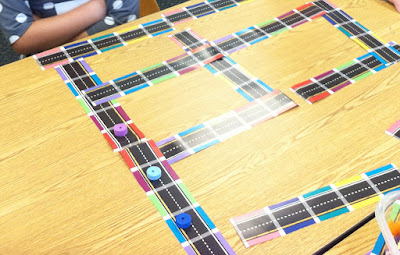Sometimes I forget my power as a teacher, as an adult with a group of young children. I was recently reminded.
On a table I had laid out the materials for a game. No one ventured to the table to even look at it. Now, I didn't arrange the materials in a very pleasing arrangement. Just laid them on the table. Maybe that was part of the reason no one was interested. We had lots of other interesting things in the room. Maybe they were just more interested in doing those things. And I support the kids' choices, even (especially) the choice not to do something. So I wasn't particularly upset that no one had used the game.
But I sat down at the table in a quiet moment and began to arrange the pieces. I think I felt a little "guilty" for not displaying the game in a better light. I moved the pieces around on the table, focusing on what I was doing.
A couple of girls came over to the table and asked what I was doing. "This is a game," I said. "I'm moving the road pieces around to make a path." They were immediately interested. I asked if they would like to use the pieces. They did. I explained that they could arrange the road as they wanted and then roll the cube and move through the path with the game pieces.
I stood and stepped back for them to work. Another girl joined them and they arranged and moved and rearranged and moved some more. I talked with them off and on as they played. (I moved to other places in the room, too, as they played.)
Some boys saw the girls playing. "What are they doing?" the boys asked. I explained the game. After a while, the girls moved on to other things and the interested boys took over.
As I reflected on this (you knew I would), I wondered if the kids would have played the game at all if I had not sat down at that table. My presence may have given the game more "importance" to the kids. If I was interested in it, maybe they would be, too.
That led to me thinking about my power. My "approval" of the game may have given it more prominence. The things I say and do in the classroom are hugely powerful. I'm the biggest and loudest in the space. By that fact alone, I command attention. Kids notice what I'm doing.
And I'm the adult. If I say something, it must be true. (That doesn't necessarily hold with older kids, but definitely with younger kids.) If I deem something good or bad or best or not worthy of attention, the kids will accept and usually absorb that opinion.
So I choose my words carefully. When looking at kids' work, I comment on what I observe without giving a value to it. I ask, "What do you think?" so kids can form their own ideas without being swayed by mine. I don't do this perfectly, after all, but I try to keep it in mind.
Use your power as the teacher/adult in a child's life to help him grow and develop, not just absorb and reflect your opinions. As Uncle Ben told Peter Parker (Spiderman): "With great power comes great responsibility."



